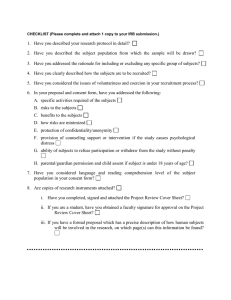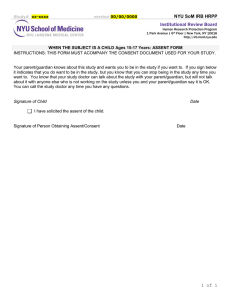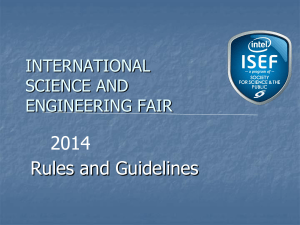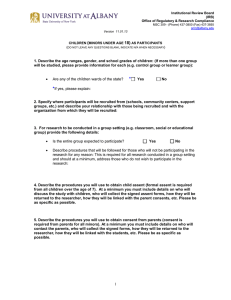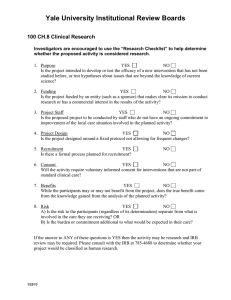Minors in Research
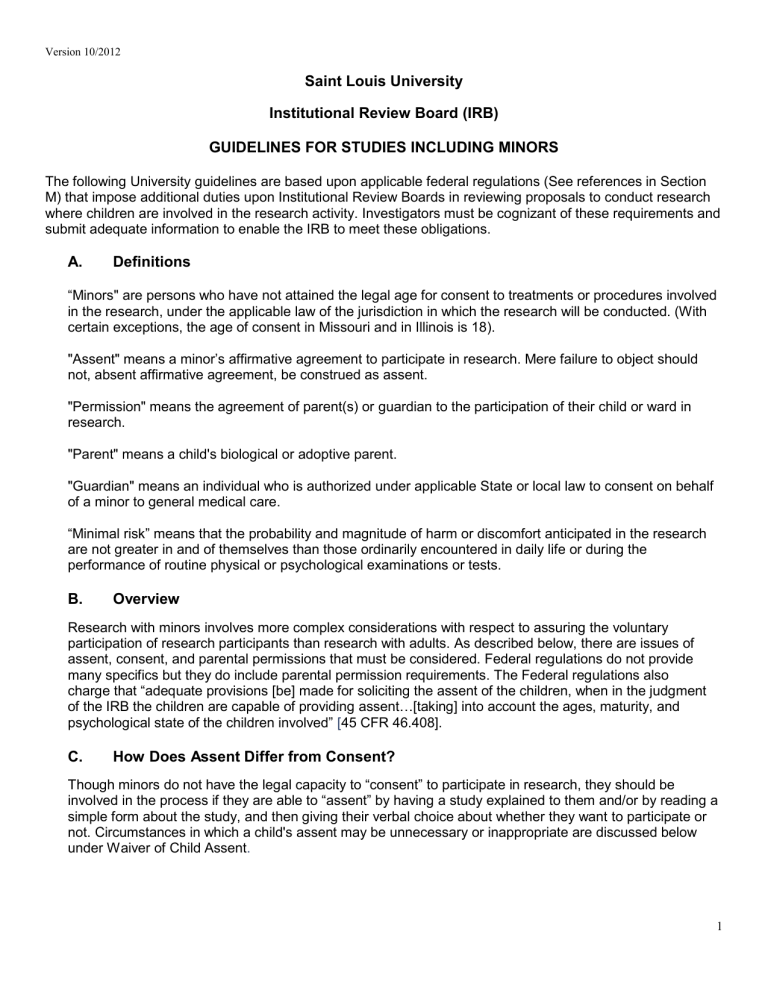
Version 10/2012
Saint Louis University
Institutional Review Board (IRB)
GUIDELINES FOR STUDIES INCLUDING MINORS
The following University guidelines are based upon applicable federal regulations (See references in Section
M) that impose additional duties upon Institutional Review Boards in reviewing proposals to conduct research where children are involved in the research activity. Investigators must be cognizant of these requirements and submit adequate information to enable the IRB to meet these obligations.
A. Definitions
“Minors" are persons who have not attained the legal age for consent to treatments or procedures involved in the research, under the applicable law of the jurisdiction in which the research will be conducted. (With certain exceptions, the age of consent in Missouri and in Illinois is 18).
"Assent" means a minor’s affirmative agreement to participate in research. Mere failure to object should not, absent affirmative agreement, be construed as assent.
"Permission" means the agreement of parent(s) or guardian to the participation of their child or ward in research.
"Parent" means a child's biological or adoptive parent.
"Guardian" means an individual who is authorized under applicable State or local law to consent on behalf of a minor to general medical care.
“Minimal risk” means that the probability and magnitude of harm or discomfort anticipated in the research are not greater in and of themselves than those ordinarily encountered in daily life or during the performance of routine physical or psychological examinations or tests.
B. Overview
Research with minors involves more complex considerations with respect to assuring the voluntary participation of research participants than research with adults. As described below, there are issues of assent, consent, and parental permissions that must be considered. Federal regulations do not provide many specifics but they do include parental permission requirements. The Federal regulations also charge that “adequate provisions [be] made for soliciting the assent of the children, when in the judgment of the IRB the children are capable of providing assent …[taking] into account the ages, maturity, and psychological state of the children involv ed” [ 45 CFR 46.408].
C. How Does Assent Differ from Consent?
Though minors do not have the legal capacity to “consent” to participate in research, they should be involved in the process if they are able to “assent” by having a study explained to them and/or by reading a simple form about the study, and then giving their verbal choice about whether they want to participate or not. Circumstances in which a child's assent may be unnecessary or inappropriate are discussed below under Waiver of Child Assent .
1
Version 10/2012
D. Assent from Children or Minors
Researchers should carefully consider and propose adequate provisions for obtaining the assent of children prior to their participating in research. The eIRB application should address whether the intended subject population of children would be capable of understanding the nature of their participation in the research, and if so, whether or how assent will be obtained.
• In determining whether children are capable of assenting, the ages, maturity, and psychological state of the children involved should be taken into account. This determination may be made for all children and adolescents to be involved in research under a particular protocol, or for each child, as appropriate. An assent process that takes into account the child ’s experience and level of understanding, assures an element of cooperation and a feeling of inclusion on the part of the child, and also illustrates the investigator ’s respect for the rights and dignity of the child in the context of research.
• Out of respect for children as developing persons, they should be provided with essential information and asked whether or not they wish to participate in the research, particularly if the research: (a) does not involve interventions likely to benefit them; and (b) the children can comprehend and appreciate what it means to be a volunteer for the benefit of others.
E. Permission from Parents or Guardians
Adequate provisions must also be made for soliciting the permission of parents or guardians. At a minimum, the federal requirements for consent indicated below must be met. However, the researcher or the IRB may determine that more stringent requirements are appropriate.
Regulatory Category of Permitted Research with Children
One Paren t’s or Both Parents’
Permission
Minimal Risk (45 CFR 46.404, 21 CFR 50.51) One parent
Requir should be sufficient
Greater than Minimal Risk, Direct Benefit to One parent ed?
should be sufficient
Subject (45 CFR 46.405 21 CFR 50.52) but IRB must determine whether one or two is required
Greater than Minimal Risk, No Direct Benefit to
Subject, but Likely to Yield Generalizable
Knowledge about Subject ’s Condition (45 CFR
46.406 21 CFR 50.53)
Both parents /legal guardians, unless one parent is deceased, unknown, incompetent, not reasonably available, or does not have legal responsibility for the custody of the child.
Greater than Minimal Risk, No Direct Benefit to
Subject, but Results May Alleviate Serious
Problems of Children ’s Health or Welfare (45
CFR 46.407 21 CFR 50.54)
Both parents /legal guardians, unless one parent is deceased, unknown, incompetent, not reasonably available, or does not have legal responsibility for the custody of the child.
F. Documentation of Assent and/or Parental/Guardian Consent
A minor’s signature is not required by the SLU IRB, but should be documented in the research record.
Parental/Guardian consent should be documented on the informed consent document and, for research where assent is being obtained; an additional signature that attests to the assent of their child is required.
The IRB may modify the requirements based on age, maturity, developmental status or other considerations that may determine the appropriateness of a given approach. Parental Permission should be obtained with the use of an Adult Consent Form using the SLU Consent Template. Researchers can request that the parental/Guardian signature requirement be waived if regulatory criteria can be met (45
CFR 46.117(c)). Waivers are not granted for FDA regulated research with the exception of research meeting the Emergency Use criteria (21 CFR 56.109(c)).
2
Version 10/2012
G. Re-Assent and Consent at Youth and Adult Milestones
• When appropriate, the researcher and the IRB need to determine that adequate provisions are made for soliciting the assent of children who reach seven years of age during study participation.
• When appropriate, the researcher and the IRB need to ensure an ongoing assent process with continuing subjects by requiring the re-assent of subjects who turn 15 years of age.
• The researcher and the IRB need to ensure that adequate provisions are made for soliciting the consent of children who turn 18 years of age during study participation. If the child participated in a study in which the only remaining procedures are data analysis, consent may not be required.
The researcher and the IRB should consider whether re-assent of children who are participating in longitudinal research or is appropriate. Written consent of children who turn 18 years of age during study participation is required .
H. Waiver of Child Assent
Even in cases in which the researcher and the IRB determine that the children are capable of assenting, the IRB may grant a waiver of the assent requirement in accordance with 45 CFR
46.116(d). Such waiver of the assent requirement by the IRB is also allowed under 21 CFR
50.55(d) for research subject to FDA regulations.
Alternatively, if either of the following are true then the assent of the children is not a necessary condition for proceeding with the research:
• The capability of some or all of the children is so limited that they cannot reasonably be consulted; or
• The intervention or procedure involved in the research holds out a prospect of direct benefit that is important to the health or well-being of the children and is available only in the context of the research.
In the above circumstances, a child's dissent, which should normally be respected, may be allowed to be overruled by the child's parents. If this may be a possibility, this should be discussed in the eIRB application (assent section) and will be considered by the Board. When research involves the provision of experimental therapies for life- threatening diseases such as cancer, however, researchers should be sensitive to the fact that parents may wish to go to extremes, even when the likelihood of success is marginal and the probability of extreme discomfort is high. Should the child not wish to undertake such experimental therapy, and if, for example, the child is a mature adolescent and death is imminent, the child's wishes should be respected.
I. Waiver of Parental Permission
In certain cases, research may be designed for conditions or for a subject population for which parental permission for inclusion in research is not a reasonable requirement to protect the subjects (e.g., neglected or abused children). More detailed examples are given below (45 CFR 46.408).
For FDA-Regulated Studies
FDA regulations (Subpart 21 CFR 50) lack the provision for waiver of parental permission. This is because the FDA does not believe it oversees studies for which such a waiver is appropriate unless it meets the
Emergency Use criteria (21 CFR 56.109(c)).
3
Version 10/2012
For Non-FDA-Regulated Studies
The IRB may waive parental/guardian permission provided “an appropriate mechanism for protecting the children who will participate as subjects in the research is substituted, and provided further that the waiver is not inconsistent with Federal, State, or local law ” (45 CFR 46.408). The IRB may also waive parental/guardian permission if it meets criteria for 45 CFR 46.116(c) or (d) .
APPLICATION NOTE : In such cases, the PI may propose a waiver of parental consent/permission under 4 5 CFR 46.408(c) or 45 CFR 46.116 in the eIRB application.
The IRB will consider all other requests for waiver of parental permission on a protocol-by-protocol basis.
J. Requirements for reporting minor pregnancy test results
While Missouri statute 431.061 provides minors the right to consent for treatment during pregnancy, participation in research is an entirely different matter. When a parent is required to provide consent for a minor to participate in research in which a pregnancy test is involved, the IRB requires that the parent be made aware of the test results. This requirement is more stringent for research than for standard clinical practice. It derives from the fact that parents cannot provide full informed consent for their child if they are not aware of all of the information relevant to a child’s participation. Therefore, based on guidance from the
SLU Office of the General Counsel, the IRB requires that both the study protocol and the document used to obtain informed consent/assent for research state clearly that results of a positive pregnancy test for a minor will be reported to the parents of the minor. Please see the model informed consent for additional information.
K. Research Involving Wards of State
If investigators are planning to involve children who are wards of the state in research, the IRB must be informed. Note: prior to enrolling wards, th e Missouri Children’s Division and Illinois Department of
Children and Family Services require review of the proposed research and there are special consent requirements. See the SLU IRB Guidance for Obtaining Informed Consent from Research Volunteers for more information.
Wards can be included in research that is approved by the IRB under 45 CFR 46.404/21 CFR 50.51 or 45
CFR 46.405/21 CFR 50.52; however, the investigator should state intentions to involve Wards in the eIRB application so appropriate determinations may be made. According to Subpart D 46.409/50.56, children who are wards of the state or any other agency, institution, or entity can be included in research approved by the IRB under Subpart D 46.406/50.53 or 46.407/50.54 only if such research is:
(1) Related to their status as wards; or
(2) Conducted in schools, camps, hospitals, institutions, or similar settings in which the majority of children involved as subjects are not wards.
If the research is approved under Subpart D 46.406/50.53 and 46.407/50.54, the IRB will appoint an advocate for each child who is a ward, in addition to any other individual acting on behalf of the child as guardian or in loco parentis.
If the investigator did not originally intend to involve children who are wards of the state in a study, but decides to do so after the study has been approved, he/she must alert the IRB before enrolling the child into the research study. The IRB requires the investigator to submit an amendment outlining his/her intent to involve a child who is a ward of state. Investigators should never enroll wards of state without prior IRB approval.
4
Version 10/2012
L. Payment for study participation
Some studies offer payment for participation. Minors may receive small gifts of appreciation for participation. Gifts should rarely be cash and should never be conditioned upon study completion. Parents or legal guardians may be compensated for travel or time lost from work.
M. References
DHHS Regulations and Guidance
• 45 CFR 46, Subpart D: Additional Protections for Children Involved as Subjects in Research
• 45 CFR 46.408(c): Requirements for Permission by Parents or Guardians and For Assent by Children
• 45 CFR 46.116(d): General Requirements for informed Consent
• 45 CFR 46.117: Documentation of Informed Consent
• OHRP (formerly OPRR), Protecting Human Research Subjects Guidebook (1993) Chapter 6,
Section C, “Children and Minors.”
• OHRP Children ’s Special Issues Page
• OHRP FAQs on Research with Children
FDA Regulations and Guidance
• 21 CFR 50, Subpart D: Additional Safeguards for Children in Clinical Investigations
21 CFR 56.109, IRB Review of Research
• FDA Guidance for Clinical Investigators, Institutional Review Boards and Sponsors: Process for
Handling Referrals to FDA under 21 CFR 50.54 – December 2006.
5
